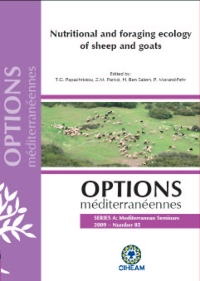| Article précédent | p. 337-349 | Article suivant |
The impact of in utero nutritional programming on small ruminant performances
The current resurgence of interest in foetal programming of post-natal production traits in small ruminants, notably sheep, is embracing reproductive performance, behaviour and the development of the immune system. It is also posing questions regarding effects on appetite and longevity. The earlier known effects on wool production and carcass composition are being revisited. Much emphasis is being placed on understanding the cellular and molecular mechanisms that are involved, in particular the alterations in the expression of genes involved in prenatal growth and development. Unlike the early studies in which the emphasis was on altered nutrition during the foetal stages of development, it is the pre-implantation embryo that is now attracting attention. The findings are demonstrating the exquisite sensitivity of the early cleavage stage embryo to its environment with permanent carryover effects on the new-born and adult. Nonetheless more quantitative data are required to estimate the economic impact of in utero programming in commercial sheep and goat production systems. It is suggested that in farming practice, some of the most important effects of in utero nutritional programming may be those relating to behaviour and immune competence with the associated production and product quality benefits coming from improvements in health and welfare.
La reprise actuelle de la recherche sur le rôle de la programmation foetale des caractères de production post-nataux chez les petits ruminants, entre autres le mouton, prend maintenant en compte les performances reproductives, le comportement et le développement du système immunitaire. Le rôle de cette programmation sur l'appétit et la longévité est présenté et les effets sur la production de laine et la composition de la carcasse, effets déjà connus, sont rediscutés. La compréhension des mécanismes cellulaires et moléculaires impliqués, en particulier les altérations de l'expression des gènes impliqués dans la croissance et le développement prénatal, est développée. Contrairement aux études précédentes dans lesquelles l'intérêt était porté sur les conséquences des modifications nutritionnelles pendant les phases foetales du développement, l'attention est maintenant portée sur la phase préimplantatoire de l'embryon. Les résultats montrent que les premières phases de la division de l'embryon sont très sensibles aux modifications de l'environnement pouvant entraîner certains effets permanents sur le nouveau-né et l'adulte. Cependant, plus de données quantitatives seraient nécessaires afin d'estimer, pour les productions commerciales d'ovins et de caprins, l'impact économique de la programmation utérine. Il est suggéré que, parmi les pratiques d'élevage, la gestion du comportement (bien-être) et celle du système immunitaire (santé) sont parmi celles qui influencent le plus la programmation nutritionnelle in utero, et impliquent une amélioration des performances zootechniques.
- [ Afficher ]
- [ Télécharger ]
- [ Exporter la citation ]
Vous pouvez télécharger la citation au format :
- [ Imprimer ]
-
Mots-clés
AGNEAU, APPETIT, CHEVREAU, CROISSANCE, DEVELOPPEMENT BIOLOGIQUE, DEVELOPPEMENT EMBRYONNAIRE, EXPRESSION DES GENES, FACTEUR DU MILIEU, FONCTION PHYSIOLOGIQUE, MAITRISE DE LA REPRODUCTION, PERIODE PERINATALECiter cet article
Ashworth C.J., Dwyer C.M., McEvoy T.G., Rooke J.A., Robinson J.J. The impact of in utero nutritional programming on small ruminant performances. In : Papachristou T.G. (ed.), Parissi Z.M. (ed.), Ben Salem H. (ed.), Morand-Fehr P. (ed.). Nutritional and foraging ecology of sheep and goats. Zaragoza : CIHEAM / FAO / NAGREF, 2009. p. 337-349. (Options Méditerranéennes : Série A. Séminaires Méditerranéens; n. 85). 12. Seminar on: Nutritional and Foraging Ecology of Sheep and Goats, 2007/10/11-13, Thessaloniki (Greece). http://om.ciheam.org/om/pdf/a85/00801027.pdf



